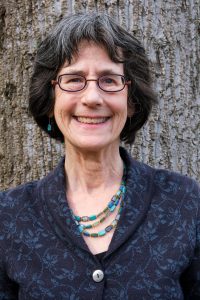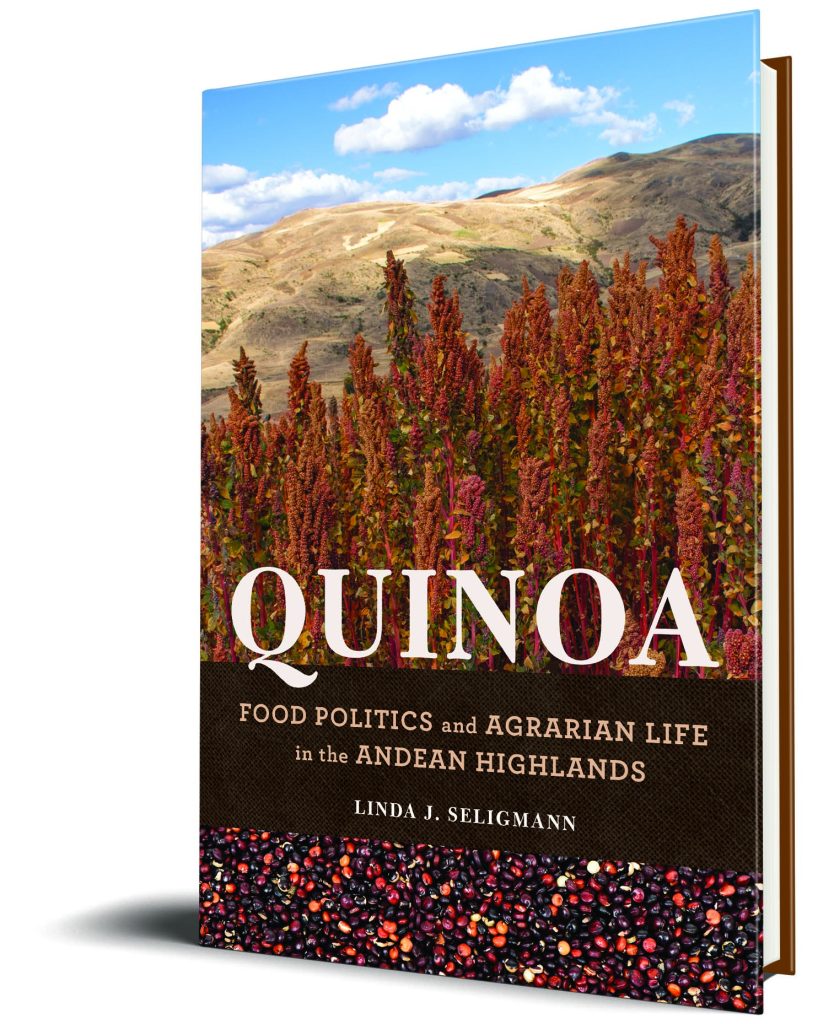Linda J. Seligmann, author of Quinoa: Food Politics and Agrarian Life in the Andean Highlands answers questions on her scholarly influences, discoveries, and reader takeaways from her new book.
Q: Why did you decide to write this book?
I was intrigued by the increasing availability of quinoa and quinoa dishes in the United States and the positive view people had of it as a healthy food. I had worked in the Peruvian Andes for over four decades and knew quinoa as a minor crop that many Quechua agrarian communities cultivated. When I returned in 2018 after five years away, I noticed many more farmers had become interested in and excited about growing quinoa and were experimenting with doing so in new ways and places. Quinoa associations heavily promoted by the regional government were forming and women were actively involved in trying to shape what kinds of quinoa were being grown and how it was being marketed. Many quinoa cookbooks had been published and there was even some controversy in the media and in more academically and science-oriented publications about the impact of the expansion of quinoa cultivation on people’s diets and well-being in the Andes. I began to dig further. While there were a few in-depth studies of quinoa, I couldn’t find very many reliable first-hand sources about the new positioning of quinoa in people’s diets, how it was affecting the array of crops that farmers were cultivating in the Andean highlands, and the more far-reaching effects it was having on people’s lives, in Peru and the rest of the world. Hence, this book.
Q: Who were your biggest influences?
Pierre Bourdieu, Eric Hobsbawm, Karl Marx, Sherry Ortner, Alessandro Portelli, James Scott, Victor Turner, and Eric Wolf were all huge influences on me because of their approaches that accounted for how cultural, symbolic, and material systems interacted and structured the tactics and strategies people arrived at to take advantage of others, as well as to confront and resist inequalities. Power takes many forms. Michel de Certeau, Akhil Gupta and James Ferguson, David Harvey, Henri Lefebvre, Setha Low, and Edward Soja illuminated for me how power intervenes in the ways that space and place structure social life. Finally, Joao Biehl’s Vita: Life in a Zone of Social Abandonment opened my eyes forever to the ways that a single being or incident can funnel outwards to explain the underlying fabric of a culture or society. That book is a giant tome and I will never forget how my students, who often grumbled about the amount of reading I assigned, could not put the book down. It taught us all so much, including how researchers must be alert and active, despite trying circumstances, in order to try to get to the bottom of things. Perhaps most important of all, it taught me that we should always try to be aware of how much we do not know.
The people with whom I have worked with as interlocutors in so many different regions of the Andes have had an indelible impact on my research and served as an inspiration for the making of this book. Indigenous people have managed to thrive in conditions that are definitely averse to their survival because of their communication of spatial grammars, aesthetic genres, and modes of written and oral narrative that are perpetuated and transformed across generations. Embedded within these modes and genres are all sorts of remarkable knowledge and observations that give rise from time to time to surprising actions and retrospective awareness on the part of others of just how valuable that knowledge is.

Q: What is the most interesting discovery you made while researching and writing your book?
I knew there were different kinds of quinoa when I first started doing this research, but I had no idea of just many varieties Quechua farmers had experimented with and developed over millennia, which were adapted to a staggering number of microecological niches.
Another additional and interesting discovery for me was realizing that even though I understood just how destructive extractive economies, such as mining, logging, or even monocropping, were, the tenets of economic extraction told only one part of the story. Affective extraction—hollowing out people’s bodies, life forces, and emotional resilience—turned out to be exceedingly important in explaining why and how development initiatives promoted by governments and non-governmental organizations, in some cases, could be so destructive.
Q: What myths do you hope your book will dispel or what do you hope your book will help readers unlearn?
I hope the book will offer a more nuanced and better understanding of the consequences for Indigenous agrarian inhabitants when a crop they grow becomes embraced, consumed, and celebrated by the rest of the world, in part because it is perceived as good for Indigenous growers and healthy for consumers. The reality shows that while Quechua indigenous people are proud of their lifeways and, specifically, of the culinary delights and tasty nature of quinoa, its status as a miracle food has had much more mixed and negative consequences than most people realize.
I also hope that readers realize that development initiatives are never neutral and that development itself requires a hard look at the kinds of assumptions that underlie so many ideas that people take for granted about nutrition, gender, well-being, and scaling-up.
Q: What is the most important idea you hope readers will take away from your book?
Too often, anthropological findings are viewed as exotic and esoteric. I hope readers will realize that the story of quinoa growers, marketers, and consumers in one district of the Andean highlands sheds light dramatically on how global economic development policies and accompanying environmental degradation land up placing in jeopardy some of the most valuable kinds of knowledge, practices, and resources humanity needs in order to survive into the future. At the end of my book, I try to explain why stories of ferocious lakes and mysterious deaths of workers and engineers in distant heights of the district where I did my work have a direct bearing on inhabitants’ decision to rise up and battle mining concessions that are placing in jeopardy the district’s ability, not only to cultivate quinoa, but also their agrarian activities altogether because of the potential pollution of their pristine water sources from the high lakes. Indigenous people I have worked with have been very open to learning from others but I think many of us have been impoverished by our ignorance of Indigenous knowledge, practices, and values. We have much to learn.
Q: What do you like to read/watch/or listen to for fun?
I read widely but I tend to read more fiction and poetry when I am working hard and writing, and more non-fiction when I have a chance to relax. One recent novel, a mystery of sorts, that has stuck with me for a long time now is Olga Tokarczuk’s Drive Your Plow Over the Bones of the Dead. And I have been dipping in and out of Wislawa Szymborska’s poetry. My non-fiction reading tastes “for fun” have lately tended toward learning more about living systems, such as the meshworks of mushrooms and fungi, and the navigational skills and migration feats and struggles of birds. In general, I want a book to be well-written rather than workman-like. My musical tastes are eclectic, but I especially enjoy good old rock and roll, jazz, and folk music/protest music from around the world. If I had to pick a favorite, it would be Bob Dylan. As far as watching, I am coming late to Breaking Bad and it is not exactly fun but I feel it epitomizes many of the points that Philippe Bourgois made In Search of Respect. It is so dark but the acting is phenomenal and the story is not far from the realities that many people grapple with on a daily basis. I’m also a great fan of Pedro Almodóvar’s films.

